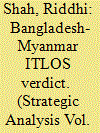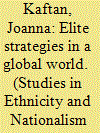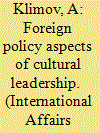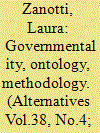|
|
|
Sort Order |
|
|
|
Items / Page
|
|
|
|
|
|
|
| Srl | Item |
| 1 |
ID:
118138


|
|
|
|
|
| Publication |
2013.
|
| Summary/Abstract |
The International Tribunal for the Law of the Sea (ITLOS) is a body set up under the United Nations Convention on the Law of the Sea (UNCLOS) to deal with disputes that emerge because of a difference in the interpretation and application of the convention. 1 Bangladesh has had an ongoing maritime boundary dispute with India and Myanmar since 1974. On 14 March 2012, the ITLOS delivered a verdict and ended the long-running maritime boundary dispute between Bangladesh and Myanmar.
In the current global world, energy resources are a crucial element for a nation's growth. India, Bangladesh and Myanmar are no different in this regard. India discovered 100 trillion cubic feet (tcf) of gas reserve in the Bay of Bengal (BoB) in 2005-2006. Soon after, Myanmar discovered seven tcf of gas reserves near the Rakhine coast. This discovery of colossal gas reserves sparked a claim-staking contest between the three countries in the BoB.
|
|
|
|
|
|
|
|
|
|
|
|
|
|
|
|
| 2 |
ID:
109165


|
|
|
|
|
| Publication |
2011.
|
| Summary/Abstract |
This study focuses on how Polish elites view the relationship between Polish identity and Poland's place in the world. Samples of priests, politicians, and intellectuals were interviewed in 1999 and 2009. A typology of four ideal types is proposed: ideological nationals, pragmatic nationals, pragmatic transnationals, and ideological transnationals. This typology can be viewed as a continuum of elite emphasis ranging between national and transnational themes. This continuum of emphasis can be seen when examining elite responses to questions concerning NATO membership, EU membership, Polish identity, and Polish democracy. This study finds that while the majority of Polish priests and politicians wished to emphasise national over transnational themes, intellectuals stressed transnational themes. Nevertheless, most acknowledged the inseparable nature of these themes when they talked about the contemporary Polish nation.
|
|
|
|
|
|
|
|
|
|
|
|
|
|
|
|
| 3 |
ID:
155365


|
|
|
|
|
| Summary/Abstract |
A YEAR AGO, on May 5, 2016, the world mass media announced a one-of-its-kind concert by the Mariinsky Theater orchestra, conducted by Valery Gergiev, in the Syrian town of Palmira. Unfortunately, this ancient jewel of the East had become the hostage of the pseudo-Islamic "state" (ISIS, banned in the Russian Federation). So a miraculous appearance of the Russian performers in the heat of an atrocious war became a symbol of the inevitable victory of Good over Evil. This concert, given by outstanding envoys of the Russian culture at the world-renown UNESCO landmark, not only gave the people of Syria hope for a peaceful future - it also demonstrated to the world community our country's high humanistic mission and a creative nature of Russian foreign policy.
|
|
|
|
|
|
|
|
|
|
|
|
|
|
|
|
| 4 |
ID:
129484


|
|
|
|
|
| Publication |
2013.
|
| Summary/Abstract |
Some critical international relations scholars have adopted theories of governmentality both as a heuristic framework for exploring modalities and functions of power and as a descriptive tool to explore the oppressive effects of global liberalism. I argue that, as a descriptive tool, much governmentality literature remains rooted in the same substantialist ontology and epistemology as the liberal discourses it seeks to criticize. This ontological orientation especially has a bearing on conceptualizations of political agency, which remain confined to the liberal struggle of power and freedom. I suggest that reimagining political agency calls for a reorganization of the ontological and epistemological framework of international relations in non-substantialist ways. The analysis maps non-substantialist positions across disciplinary lines. By treating power and subjects as deeply imbricated, non-substantialist ontologies examine political engagements as processes of hybridization aimed at producing practical effects in specific contexts.
|
|
|
|
|
|
|
|
|
|
|
|
|
|
|
|
| 5 |
ID:
095170


|
|
|
|
|
| Publication |
2009.
|
| Summary/Abstract |
Early in the 21st century, the effects of the Soviet Union's disintegration are only just starting to come to the fore, but I am convinced that the old world order is already dead.
Indeed, deprived of an external threat, the United States has been gradually losing its former role as global hegemon, while liberal democracy has proven unable to maintain its former Great Power status. The fear of the "red plague" in the East disappeared together with the Soviet Union; the old ideological bonds have slackened, while a new ideology is being formulated on the basis of particular interests. The political elite is still clinging to its imperial ambitions, however its social support is dwindling.
|
|
|
|
|
|
|
|
|
|
|
|
|
|
|
|
| 6 |
ID:
170597


|
|
|
|
|
| Summary/Abstract |
Interaction and long-term strategies are essential in today’s globalized world, yet both Russia’s foreign policy and its relations with its Western partners are deteriorating. The Russian government frequently sends out controversial messages: from sovereignty, its own agenda, and “a turn to the East,” to coherent integration with the global, or Western, agenda. This is especially true when it comes to education. Russians are highly educated; thus, education is automatically perceived as a soft power tool. However, in reality, major obstacles can emerge. The paper analyzes perceptions and attitudes of foreign students towards Russia: its image, political system, and role in the contemporary world. A survey conducted in 2017 (online and offline, half-closed anonymous questionnaire N100) involved foreign students, some of whom studied at Russian higher education institutions and some who did not. The students were asked about how they perceived Russia’s role in the modern world, its soft power resources, political regime, and values. The research revealed a clear difference in the perception of those factors. It also showed that educational migration sometimes provides unexpected results that can contradict the aims of Russian education policy
|
|
|
|
|
|
|
|
|
|
|
|
|
|
|
|
|
|
|
|
|